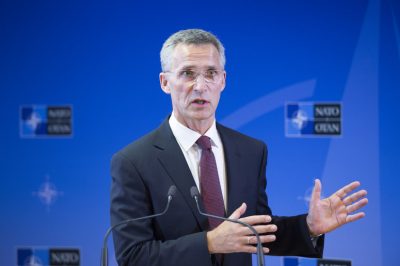NATO’s secretary general, Jens Stoltenberg, has admitted to engaging in defiant and controversial tactics when he was still the Norwegian Labour Party’s candidate for prime minister. In his new autobiography being released on Friday, Stoltenberg reveals that he basically plotted a party coup that overthrew its leader at the time, Thorbjørn Jagland, who now leads the Council of Europe.

Stoltenberg, who claims that his cooperation with Jagland was no longer functioning, promoted his new book on the Scandinavian talk show Skavlan. In the show due to air Friday night, Stoltenberg admits he went behind Jagland’s back and started plotting with some of his supporters to cut the Labour Party into factions, with the goal that Stoltenberg would ultimately take over as both party leader and its prime minister candidate. He admits to systematically working to overthrow Jagland, because Stoltenberg felt the party was on a destructive course.
Stoltenberg told Norwegian talk show host Fredrik Skavlan that the tough political plot took shape “around 2000, 2001,” after it became clear to Stoltenberg that he and Jagland were not working well together and “the situation for the party had become so bad.” Labour had, at the time, a dual-leadership and the party was also split between its leftist and more moderate factions.
Lost two elections
After losing the election in 1997 for reasons blamed largely on Jagland, Stoltenberg briefly became prime minister by default three years later after the center-right government coalition that won fell over an environmental issue. Labour lost power again in 2001, though, and Stoltenberg told Skavlan that he had to make a choice: either try to take over full leadership of the party alone or withdraw completely. He simply couldn’t work with Jagland any longer. The two hadn’t gotten along well since the early- to mid-1990s and “our cooperation no longer functioned.”
And then, Stoltenberg admitted, “I did somehing you really shouldn’t do, namely to being to fraction the party, and work against the sitting leader (Jagland).” He laid plans with people he relied on at the time, in all secrecy.
“I remember we met in an apartment at Bislett, than then we tried to arrive a different times and from different directions,” Stoltenberg told Skavlan. “We were all well-known, and if anyone had seen us arriving together, they’d think we were fractioning. That’s what we were doing and we couldn’t reveal it.”

Jagland, who declined comment Friday on either Stoltenberg’s book or his appearance on Skavlan, fought hard to retain shared leadership of the party. Stoltenberg ultimately prevailed, though, and Jagland announced he would not stand for re-election as party leader under pressure in early 2002. Stoltenberg was elected at the party’s national meeting shortly thereafter as both party leader and prime minister candidate, with no opposition. Labour won the next parliamentary election in 2005, again in 2009, and Stoltenberg was prime minister for eight years, until Labour lost in 2013 and Stoltenberg went on to become secretary general of NATO.
Political commentators in Norway were calling Stoltenberg’s admissions “historic,” since top politicians rarely reveal details about brutal power struggles within their parties. Others called the struggle between Stoltenberg and Jagland “dramatic,” and it raises questions about any effect it may have on relations between NATO and the Council of Europe, with fellow Norwegians but former rivals as the bosses of both. Stoltenberg conceded that it was a difficult period.
“It was hurtful for Thorbjørn Jagland, it was hurtful for me, it was hurtful for the party,” Stoltenberg told Skavlan. But he saw no other way out. Jagland refused to respond to questions about what amounted to a coup within his Labour Party unseat him, issuing only a statement via his wife and press spokesperson Hanne Grotjord: “I have never wanted to clarify what really happened before I withdrew as the Labour Party’s leader. I didn’t want to when Stoltenberg was prime minister and I was the parliament’s president. I don’t want to do it now when we lead two large international organizations.”
Questions also remain about why Stoltenberg is coming out with his political memoirs now, at an age of just 57. It’s titled Min historie (My story) and signals his break with Norwegian politics and the Labour Party since becoming NATO’s boss. The book is also full of his personal assessments of several other Labour Party politicians like Trond Giske, whom Stoltenberg said had too great a need for control, and his longtime friend Jonas Gahr Støre, who took over as Labour Party leader when Stoltenberg resigned to join NATO. Stoltenberg strongly supports Støre, who also will be Labour’s prime minister candidate in next year’s parliamentary election.
newsinenglish.no/Nina Berglund

